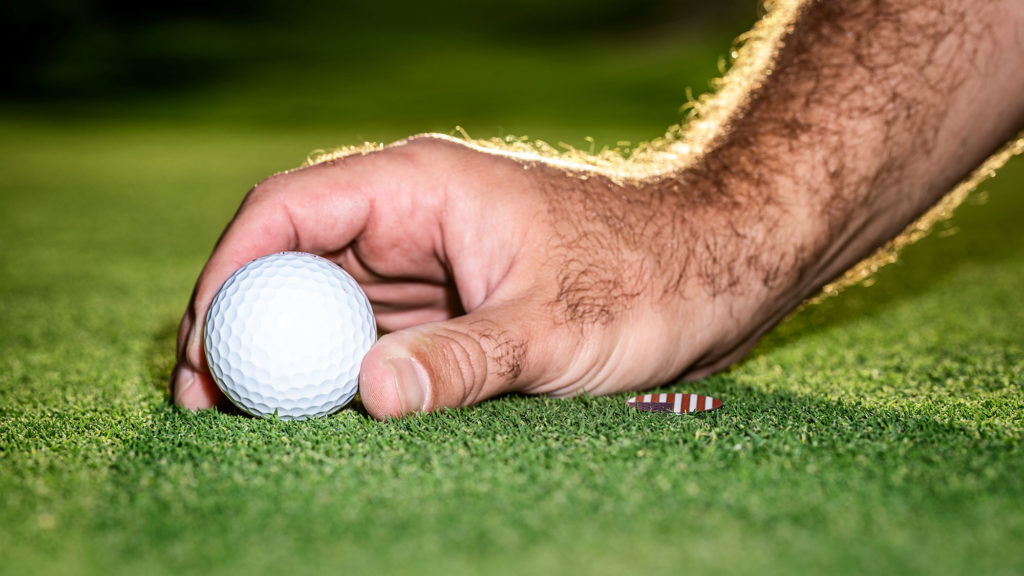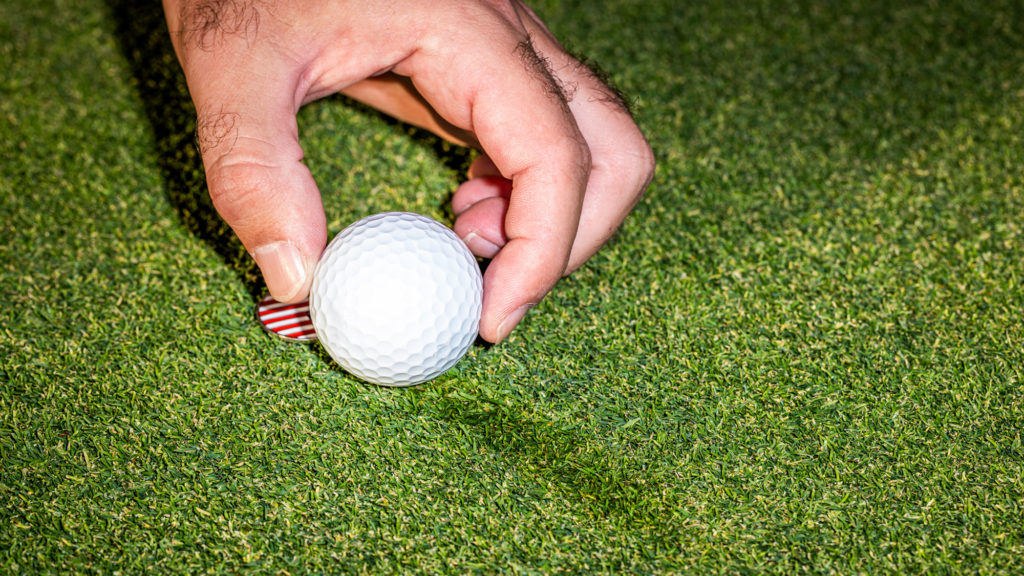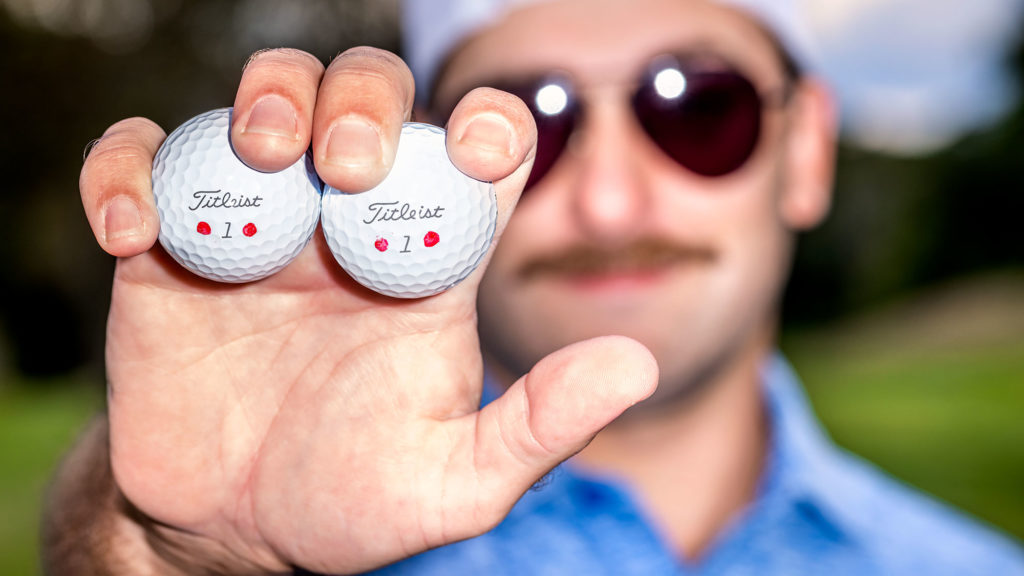[Photographs by Steve Boyle]
Master criminal Willie Sutton said it best when asked why he robbed so many banks: “Because that’s where the money is.” Shaving shots on the golf course has the same obvious, irresistible allure for some players. You probably know a golfer who would foot-wedge a ball if it meant winning the C-grade comp in a charity best-ball.
With that in mind, a murderer’s row of Major champions, World Golf Hall of Famers, legendary instructors and noted golf gambling sharks were asked to share the best stroke-heisting tricks they’ve seen. Use this guide to help spot bad behaviour and catch these dark artists in the wild – or apply it in other ways (at your own risk).

1. Whipper-snip for a better swing path
Navigating whispy grass around your ball – or small, low-hanging branches potentially in your backswing – can make it necessary to contort your swing like a rhythmic gymnast twirling a streamer. Or, if you’re in a devious mood, a series of forceful practice swings can clear the decks of most of the offending plant life, providing a clear path to the ball.


2. Give your lie a little love
Playing the wrong ball is bad, so a conscientious player should do everything possible to get a positive ID when a shot ends up obscured by deep rough. Nefarious types, however, might enhance that ID process by pulling it out of a clump of deep grass and then replacing it on a wide-open launchpad. Now that’s a preferred lie!

3. Lube up for straighter tee shots
Hall of Fame baseball pitcher Gaylord Perry was famous (or notorious) for loading up the ball with anything from Vaseline to snot to make his pitches move unpredictably. When you load up the face of your driver, it has the opposite effect. Sliding a sheen of ChapStick, sunscreen or saliva across your driver’s face reduces the friction imparted on the ball – which reduces the sidespin that sends your shots off the map. No more worrying about the trouble on the left or right. You can take this cheat to the next level of skullduggery by wiping away the evidence with the fuzzy inside of your headcover as you walk off the tee.

4. Use the right ball for the right moment
Does the thought of hitting a putt with that rock-hard distance ball you use to get max distance off the tee make your hands hurt? Keep a buttery multicover tour ball in your pocket, and make the switcheroo after you mark on the green. Even bolder practitioners switch balls if they get some privacy far away from the rest of the foursome. More spin sure does come in handy.

5. Sneak up on the hole
Research is questionable on the benefits of shortening a putt by a few inches, but for the cheat, it’s more about mindset. If you’re determined to play your four-foot comebacker an inch or two closer to the cup, start by aggressively sliding the coin under the ball when you mark. Upon replacement, flatten your thumb against the grass to obscure the distance between the ball and your marker. On tour, the code for this is “getting casual” with the marking process.

6. Stand your ground in bunkers
Who’s to say where the line is between legally getting into a stable stance in a bunker and illegally building a stance? Seems pretty grey – so go to town. Excavating sand with your Softspikes like a frenzied wombat is especially useful on awkward uphill or sidehill lies. Remember: it’s not a bad lie unless you make it so.


7. Water down your drives
Would you like a more subtle variant of the cheat where you apply some kind of grease to the driver’s face? Stand in the longer grass on the side of the tee and casually make a one-handed swing through the dewy turf as you wait impatiently for the group in the fairway to move up. Adding moisture to the face also reduces spin, turning your slice or hook into something that finds the fairway.

8. Have some fun in the sandpit
The proliferation of high-definition broadcast cameras at professional events has given this once-shadowy manoeuvre more publicity in recent years. When you catch a lie in a bunker that features a big clump of sand behind your ball, you could steer your backswing path to blast the clump of sand out of the way before coming back down to impact. It’s a two-stroke penalty if caught, but that’s a big if. In a casual home game, it’s pretty much undetectable unless your playing partners have binoculars and a healthy dose of suspicion.

9. Show your ball the way home
One of the most satisfying old-school tricks of the dark arts makes physics your friend on ticklish putts. As you replace the ball in front of the mark, pull it with some force along the preferred start line of the putt. The depression you create will keep the ball in the channel for a few inches, just like the gutter corrals a crooked tenpin bowling ball.

10. Put the ‘pro’ in provisional
Bobby Jones would have clearly marked a provisional differently than his first ball, so he would know which one he found if he hit them in the same area. Are you Bobby Jones? That’s your call, but some might hit a provisional marked identically with the original. If they find one of them, it’s gotta be the first one – every time.

Dahmen’s take
This might sound harsh, but you know the guys who win “low net” at most of the tournaments they play? They’re not great golfers; they’re probably not great husbands; and I bet they’re not great at their jobs. But they are great at manipulating the system.
Handicapping is supposed to be what makes golf the greatest game in the world – a tour pro can have a fun match with a 100 shooter – but it only works if everyone is honest and consistent. I don’t laugh when someone jokes after a poor round, “I’m definitely posting this one.” It pisses me off.
There’s one guy at my club who says he’s a 4-handicapper. I’m a plus-5, so I give him 4½ strokes per side. Every time we play for $100, he beats me. Then he’ll let me back into his wallet for $20. When stakes go up again, he’ll be right around par.

